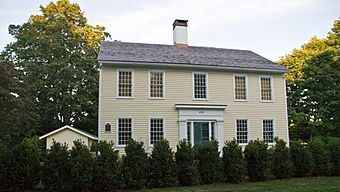Hezekiah Palmer House facts for kids
Quick facts for kids |
|
|
Hezekiah Palmer House
|
|

Hezekiah Palmer House in 2008
|
|
| Location | 340-408 Leete's Island Road, Branford, Connecticut |
|---|---|
| Area | 0.5 acres (0.20 ha) |
| Built | c. 1830 |
| Architectural style | Greek Revival, Colonial, New England Colonial |
| MPS | Colonial Houses of Branford TR |
| NRHP reference No. | 88002641 |
| Added to NRHP | December 1, 1988 |
The Hezekiah Palmer House is a very old and special home located in Branford, Connecticut. It's found on Leete's Island Road. This house was likely built in the early 1800s. It's a great example of old building styles, like Georgian architecture. Because it's so important, it was added to the National Register of Historic Places in 1988.
What is the Hezekiah Palmer House?
The Hezekiah Palmer House is a historic building. It stands in the Stony Creek area of eastern Branford. You can find it on the east side of Leete's Island Road. It is just north of where Stony Brook Road meets Thimble Island Road.
Exploring the House's Design
This house is two and a half stories tall. It is made of wood. It has a roof that slopes down on two sides, called a side-gable roof. There is a large chimney in the middle of the house. The outside walls are covered with clapboards.
The back of the house has a section that slopes down. This gives it a classic New England saltbox shape. The front of the house has five sections, called bays. The windows are placed evenly around the main door. The front door has narrow windows on the sides. It also has flat columns, called pilasters. These support a decorative frame above the door.
Who Lived Here? A Look at its History
People have traditionally thought the house was built around 1830. This idea comes from a number carved into one of its main wooden beams. However, old land records tell a slightly different story.
These records suggest that James Palmer built the house. He was Hezekiah Palmer's father. The house was likely built sometime before 1830. Hezekiah Palmer is listed as the owner in 1852. The way the house is built, with a mix of old Colonial and newer Greek Revival styles, also suggests it might be older than 1830.



